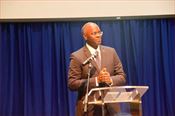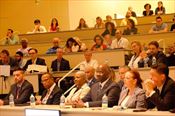in deze afdeling
De Gouverneur Toespraken
Building Hurricane Resiliency through Disaster Management and Disaster Medicine Lessons
Opening Address
By The Governor of Sint Maarten
His Excellency drs. Eugene B. Holiday
Delivered at the Opening Ceremony of the
“2019 International Conference
On disaster Medicine & Hurricane Resiliency”.
March 8, 2019
American University of Caribbean School of Medicine
Cupecoy, Sint Maarten
Ladies and gentlemen
Good evening,
I am pleased to join and welcome you for the opening of this conference on disaster medicine and hurricane resilience. To our guests from overseas, I extend special greetings and invite you to explore Sint Maarten and enjoy the warm hospitality of our friendly island.
You are here at this conference as government officials and as professionals responsible for healthcare delivery, disaster preparedness, emergency response, and medical education to foster collaboration among yourselves and thus our countries. Having examined the objectives and program of this conference, I applaud the decision of the American University of the Caribbean School of Medicine, AUC and the Harvard Medical Faculty Physicians of the Beth Israel Deaconess Medical Center to team up to organize this important event. Dr. Chumley and Dr. Quirk of AUC and Dr. Ciottone of Harvard Medical Faculty Physicians I am particularly pleased that you have chosen Sint Maarten as the location of your newly established Caribbean Center for Disaster Medicine. Please because we on Sint Maarten look to play a leading role in disaster management.
Ladies and Gentlemen,
Natural disasters, in various forms, strike indiscriminately around the world leaving behind a trail of severe physical and emotional damage. We have all seen or experienced the heartbreak as a result of the loss of lives, the loss of homes and the destruction of critical national infrastructure caused by hurricanes here in Sint Maarten, in the wider Caribbean and on the American Main land. Notable in this regard are hurricanes “Luis in 1995”, “Ivan in 2004”, “Katrina in 2005”, Sandy in 2012, “Irma in 2017”, and “Maria also in 2017”. And all indications are that hurricanes are only going to become stronger and more devastating as a result of the impact of climate change. In fact, the World Travel and Tourism Council predicts that the Caribbean will become the most at-risk tourist destination in the world between 2025 and 2050 . I believe that we already are.
We must therefore continue to build hurricane resiliency; that is we must continue to build our national physical infrastructure and institutional and human capacity to effectively prepare for, withstand and recover quickly from the effects natural disasters. With that in mind, it is imperative that we draw from and build on the lessons of our experiences with disaster management, in general, and disaster medicine, in particular.
Ladies and Gentlemen,
The people of Sint Maarten, like the people of the wider Caribbean, are no strangers to hurricanes. Given that hurricanes are the most frequently occurring natural disaster on our island, disaster preparedness and hurricane preparedness are virtually synonymous for the public. A brief examination of the development of our disaster management program, in terms of preparedness, risk mitigation, response and recovery, show the resiliency lessons learned from every major storm. Some important lessons, which are by no means complete, include the following:
• In 1995 hurricane Luis among others underscored the importance of enforcing strict building codes, of adequate emergency housing and of a more robust electricity and telecommunication grid. As a result, emergency homes have been built and significant investments have been and are being made to put the cables of our national grid underground.
• In 1999 hurricane Lenny highlighted the importance of improved flood management. The infrastructure for the management of the water level of the ponds as the catchment area for flood water has subsequently been upgraded.
• And in 2017 hurricanes Irma accentuated the relevance of public order controls, of evacuation protocols, of collaboration with partner government agencies, of coordination with international non-governmental organizations and of maintaining adequate water, food and medical supplies at the national level and at the household level.
And as with previous lessons government is taking steps to further strengthen resiliency in these areas.
The question for this conference however is: What resiliency lessons have we learned from a perspective of disaster medicine? That is from the perspective of the provision of disaster medical services to save lives, to care for the injured, and to prevent outbreak of disease, as a result of hurricanes. I am sure that the session regarding “St. Maarten/Saint Martin Experiences of Hurricane Irma: Healthcare and Public Health Perspectives” as well as other sessions will provide some answers to that question. To anticipate the discussion, I shall however highlight a few points, as food for thought during your sessions.
The role of disaster medicine has broadly speaking been around throughout human history. It is therefore not surprising that “Public Health and Medical Assistance” has a central role as an Emergency Support Function, in our national disaster management organization and program. Within that context it is, as you know, important to note that a medical disaster, by definition, is an event that requires medical services which exceed available resources. This is particularly challenging in the context of small island states, like Sint Maarten, where the human and physical resources are limited and part of the disaster area. Critical points of attention and lessons learned in this regard include:
1. The importance of securing the hospital from damage;
2. The imperative of operational self-sufficiency of the hospital during and in the immediate aftermath of hurricanes;
3. The need to secure or restore the supply of critical services, such as water, electricity and telecommunication to keep the hospital operational;
4. The importance of having adequate medical supplies; and
5. The maintenance of effective medical evacuation protocols.
These issues translate in the difference between life and death and between emergency and disaster. And as such underscore the significance of disaster medicine in building hurricane resilience. Hurricane resilience therefore requires that all health care and public health professionals within and across our borders must be prepared to respond to emergency situations. And as I make these remarks, I am aware that I am in fact preaching to the choir. Nevertheless, I believe that it is important to reemphasize the point given our common interest and challenges as a result of the real risks associated with climate change.
I am, from the perspective of our common interest and challenges, encouraged to see representatives from a wide variety of nations from the Caribbean, the Americas and Europe gathered here for this conference. Experience show that natural disasters, in general, and in the Caribbean, in particular, take on regional and international dimensions requiring close cooperation and coordination between countries.
The attendance of representative from countries from the region, and with close links to the region has the potential to strengthen cooperation and coordination and is testimony that our people have a common interest in disaster preparedness and building hurricane resilience. A fact which the AUC and the Harvard Medical Faculty Physicians recognize with the organization of this conference and the establishment of the Caribbean Center for Disaster Medicine.
I therefore congratulate the AUC, through Dr. Chumley and Dr. Quirk and the Harvard Medical Faculty Physicians through Dr. Ciottone with the organization of this conference and wish you much success with the further development of the Caribbean Center for Disaster Medicine.
Ladies and gentlemen,
In closing, I trust that your discussions and interactions will lead to greater insights and answers in the management of medical disasters and as a result build greater hurricane resilience across our nations. I therefore wish you much success in your deliberations during the coming days.
Thank you.

